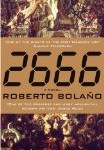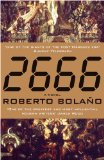Steph and Claire are hosting a read-along for the highly acclaimed book, 2666, by Chilean author Roberto Bolaño. The novel is 900 pages long, and divided into 5 parts. We are reading one part a month.
Here are my thoughts on Part 4: The Part About the Crimes
I loved Part 3, I felt that all the random, seemingly unconnected events of the first two parts were finally coming together. The end of the third section was such a cliffhanger that for the first time in this read-along I was tempted to dive straight into the fourth part. I had also read many reviews for 2666 which stated that all the action finally occurred in Part 4.
Unfortunately, Part 4 did not live up to my expectations, and I found it to be the weakest section so far.
As suggested by the title, this section focuses on the crimes. Throughout the first three sections we had heard snippets of information about the chain of women murdered in the town of Santa Teresa, but no specific facts. This section corrects that by giving detailed information about every victim. Almost every paragraph introduces us to a new victim, noting the month they were murdered, their physical appearance and the way in which they were killed. Instead of giving a voice to each of these unfortunate woman I felt that the repetition distanced me from each of them. The continual jumping from one person to the next meant that I didn’t connect with any of them, and they became of blur of names, dates and physical attributes.
I had been worried about the violence in this section, as several people had warned me about the graphic detail, but because I felt no emotional connection to the victims the violence did not bother me at all. Some of the descriptions were more brutal than others, but none of them affected me at all. In fact this entire section left me cold. It felt more like police notes than a novel and I gained little enjoyment from reading it at all.
I made a note of several quotes that I thought would be representative of this chapter and was interested to discover that they all sounded more beautiful and profound when taken out of context:
I’m talking about visions that would take away the breath of the bravest of brave men. In dreams I see the crimes and it’s as if a television set has exploded and I keep seeing, in the little shards of screen scattered around my bedroom, horrible scenes, endless tears.
It seemed as though being surrounded by the details of the crimes reduced the beauty of everything.
I am now apprehensive about reading the final section. I am really hoping that everything comes together in a complex and impressive way, as otherwise I think I will be disappointed by the book as a whole.
![]()
Were you affected by the graphic violence in this section?
Are you looking forward to reading the final part?


12 replies on “2666 – Roberto Bolaño. Part 4: The Part About the Crimes”
Ooooh, not a good score at all. I hope it turns around for you. There should be some redeeming payoff for reading this monster!
Sandy, I know – I have invested so many hours into it. I really hope the ending makes it all worthwhile.
I have stalled on this section with just about 100 pages to go. I don’t know what it is about this book, but I’m really not connecting with it, which as I’m sure you know, tortures me to no end. So far the section I’ve enjoyed the most is the first section.
I haven’t really found the violence difficult to deal with in this section, so much as I feel it is just grinding me down. Some have suggested this might be the climax of the story, the revealing of all of the murders, but for me, I wonder why we need to read so much about them, when I am quite confident that all of these mysteries will go unsolved. I don’t think there is just a single killer.
Sigh. It is so hard for me to pick this book up and read it, because I find so little to hold onto. Let me be clear and say that the writing is certainly not bad, but (and maybe you feel similarly), I don’t find it particularly wonderful/beautiful/poetic in any real way. Sometimes there is a turn of phrase that I find arresting, but generally I feel like I’m just plodding on. And the story doesn’t motivate me either, so it all comes to me dragging my feet when it comes to this one… 🙁
Oh, also, I forgot to mention this in my comment, but so far the only thing I’ve thought about this section that I think is mildly inspired, is I wonder if the murders are somehow an extension of the theme of madness that has coursed through the other sections? I noticed that a lot of the murders are confessed to by lovers or husbands who cite jealousy or passion as motives, and it made me feel like there is some sort of murderous madness sweeping Santa Teresa.
Steph, I know exactly what you mean – it took me ages to read this section and it was all so tedious. Now I’ve finished it I have a real sense of relief and it is actually growing on me now I have had more time to reflect on it.
I think Bolano might be making a statement about what we come to expect in a crime novel and by pausing the action he is making us think about the crimes instead of the race to resolve them.
He is clearly a talented author, but I’d hate to have read this by myself. I have gained a much better appreciation of it now I’ve read other people’s thoughts on it.
I hope you manage to get through those last 100 pages soon. Hopefully Part 5 will be a big improvement.
You’re right, Jackie – out of context that quotation is just beautiful (and Bolano pulls off my favourite authorly trick of using a simile instead of an adjective to make the rhythm of the sentence work). The only stumble is the “in dreams”, which is a lazy cliche (and possibly a bit of a wink-wink pop reference).
You note the repetition of the violence distancing you from it. That’s a really important point. I once wrote a paper that needed a section on forma dn content and modernism, and for some reason I found myself writing about Stev McQueen’s Turner Prize winning film “Deadpan”, which is just a repetition of the same loop of film of a house falling down around the artist (it was based on a Buster Keaton [I think] sketch, hence the comedic reference in the title). The endless repetition has the effect of absolutely draining the events portrayed of any meaning (I think the point I was making in my paper was that modernism uses formal tricks like this to cut the link between prose and meaning, and let the reader get to the bare bones of the language itself). If done well (as McQueen does) this can be mind-bendingly effective, because the artist creates a hollow man (I believe I actually made a crass T S Eliot joke in the paper), a formal skeleton consisting of langugae, which the reader then floods with meaning. In othr words, Bolano is stopping you thinking about THESE VICTIMS and providing your mind with a space where it can think, in a free but structured way, about crime and victims in the absolute abstract.
Clearly, though, he hasn’t done it as well as he might have done, or as well as Deadpan, The Wasteland, even Andy Warhol, succeed ni doing.
Dan,
“The endless repetition has the effect of absolutely draining the events portrayed of any meaning ”
Exactly. I haven’t read any of the other books you mention, so can’t compare them. It is possible that he has done this very well, but it isn’t a devise I like.
I can appreciate it more now that I have finished it, but at the time it drove me mad.
Have you read any Bolano?
It’s a very self-conscious way of writing, and trying to make readers think is always a questionable tactic (and one which gives literary fiction a bad name – I like stories to stay with me, nudging me from the back of my mind, but when I’m actually reading I want to be lost in the book’s world and not fending off blows from the author’s clever stick).
I haven’t – one of my fellow Year Zero writers is a huge Bolano fan and as a result 2666 is on my TBR, but there always seems to be somethig just a bit more appealing and less daunting. I think, like you, I should have approached reading it as part of a group!
I really want to read this book, but it’s going to have to wait until sometime next year. Or later. I’ll be curious to see how you end up feeling about the book overall.
Lezlie
Lezlie, It is weird to think that I have read 4/5 sections and still don’t know how I am going to feel about this book . The ending is going to be so important to me. I really hope it is good!
So sad to hear, Jackie. 🙁 But that’s okay.
While to you the the passage you picked “sounded more beautiful and profound when taken out of context,” to me it was completely the opposite. The beautiful passages were such a contrast to the murders that they completely stood out while I was reading.
This wasn’t my favourite part of the book, either. In fact, it’s my least favourite, but I didn’t see it as the weakest section because it places emphasis on the main subject matter which is the killings.
Hope you do better with Part 5! Hope we all do! 😀
Claire, I love the way we all see things so differently!
The beautiful passages stood out while I was reading them, but they seemed to be made less important/mundane by the repetitive death around them.
I really hope we all enjoy section 5!